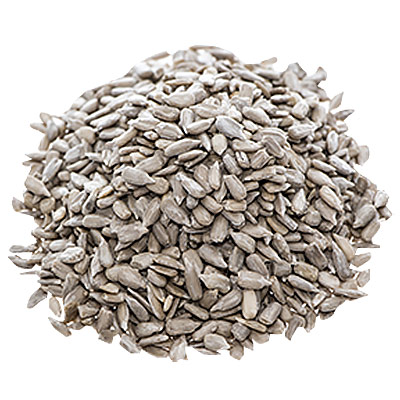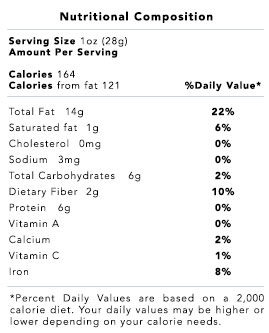
Scientific Name
Helianthus annuus
Grade
Conventional

Scientific Name
Helianthus annuus
Grade
Conventional

Facts
Sweet, nutty sunflower seeds are an excellent source of essential fatty acids, vitamins, and minerals. Sunflower kernels are actually employed to extract edible oil at commercial levels. Besides being eaten as popular snacks, they are also used in the kitchen to prepare a variety of recipes. Sunflower is a tall, erect, herbaceous annual plant belonging to the family of Asteraceae, in the genus, Helianthus. Its botanical name is Helianthus annuus. It is native to the Middle American region from where it spread as an important commercial crop all over the world through the European explorers.
Nutrients
Delicious, nutty, and crunchy sunflower seeds are widely considered a healthful food. They are high in energy: 100g of seeds hold about 584 calories. Nonetheless, they are one of the incredible sources of health-benefiting nutrients, minerals, antioxidants and vitamins.
Much of their calories come from fatty acids. The seeds are especially rich in poly-unsaturated fatty acid linoleic acid, which constitutes more than 50% fatty acids in them. They are also good in mono-unsaturated oleic acid which helps lower LDL or "bad cholesterol" and increases HDL or "good-cholesterol" in the blood. Research studies suggest that a Mediterranean diet which is rich in monounsaturated fats helps to prevent coronary artery disease and stroke by favoring healthy blood lipid profile.
Like in other nuts, they too are a very good source of proteins loaded with fine quality amino acids such as tryptophan that are essential for growth, especially in children. Just 100g of seeds provides about 21g of protein (37% of daily-recommended values).
In addition, sunflower seeds contain health benefiting poly-phenol compounds such as chlorogenic acid, quinic acid, and caffeic acids. These compounds are natural anti-oxidants, which help remove harmful oxidant molecules from the body. Furthermore, chlorogenic acid helps reduce blood sugar levels by limiting glycogen breakdown in the liver.
Furthermore, the seeds are indeed a very rich source of vitamin E; contain about 35.17g per 100g (about 234% of RDA). Vitamin E is a powerful lipid soluble antioxidant, required for maintaining the integrity of cell membranes, mucus membranes, and skin by protecting from harmful oxygen-free radicals.
Sunflower kernels are one of the finest sources of the B-complex group of vitamins. They are very good sources of B-complex vitamins such as niacin, folic acid, thiamin (vitamin B1), pyridoxine (vitamin B6), pantothenic acid, and riboflavin.
Sunflowers are incredible sources of folic acid. 100g of kernels contains 227 µg of folic acid, which is about 37% of the recommended daily intake. Folic acid is essential for DNA synthesis. When given to expecting mothers during the peri-conceptional period, it may prevent neural tube defects in the baby.
Niacin and pyridoxine are other B-complex vitamins found abundantly in the sunflower seeds. About 8.35 mg or 52% of daily-required levels of niacin is provided by just 100 g of seeds. Niacin helps reduce LDL-cholesterol levels in the blood. In addition, it enhances GABA activity inside the brain, which in turn helps reduce anxiety and neurosis.
The seeds are incredibly rich sources of many essential minerals. Calcium, iron, manganese, zinc, magnesium, selenium, and copper are especially concentrated in sunflower seeds. Many of these minerals play a vital role in bone mineralization, red blood cell production, enzyme secretion, hormone production, as well as in the regulation of cardiac and skeletal muscle activities.
Just a handful of sunflower kernels a day provides much of the recommended level of phenolic anti-oxidants, minerals, vitamins, and protein.
Preliminary Health Research
Skin Protection
Sunflower seeds contain an abundant amount of vitamin E (35.17 grams per 100 grams).
Vitamin E functions as an antioxidant which aids in the maintenance of the cell membrane’s integrity. It works to protect the membrane from the harmful oxygen-free radicals. Also, it is very helpful in preventing UV damage to the skin.
Anti-inflammatory agent
Having an anti-oxidant agent, Vitamin E, the free radicals in the body are neutralized. If this function doesn’t work, the fat-containing structures and molecules, such as the brain cells, cell membranes, and cholesterol will be damaged. Vitamin E has a significant role in this case by decreasing the inflammation. This results to symptoms reduction, particularly in osteoarthritis, rheumatoid arthritis, and asthma.
Good effect on the nerves
Sunflower seeds also contain magnesium. Magnesium is very important for neurologic functioning. It works by prventing calcium from affecting the nerve cells, and instead, causes the nerves to relax. Therefore, letting the blood vessels and muscles relax as well. When magnesium is low in the body, calcium enters the nerve cell which causes it to deliver too many messages. This results in contraction. As an effect of low magnesium levels, the following occurs: soreness and fatigue, migraine headaches, higher blood pressure, and muscle tension. Tryptophan, an amino acid contained in sunflower seeds, aids in serotonin production. Serotonin calms the brain, eases the tension, and promotes relaxation. Niacin which belongs in the B-complex group of vitamins helps in improving the GABA brain activity. This leads to anxiety and neurosis reduction. Folic acid, which is also contained in sunflower seeds, can help with DNA synthesis. This is especially the case in mothers who are in their peri-conception period. Folic acid lessens or prevents the occurrence of neural tube defects in the baby.
Cardiovascular system improvement
As mentioned above, sunflower seeds are an excellent source of vitamin E. Vitamin E is significant in the prevention and management of various cardiovascular diseases. This is because Vitamin E is an antioxidant which acts on destroying the free radicals to prevent oxidizing cholesterol. Once this occurs, the cholesterol will be prevented from clogging the arteries. Therefore, saving a person from stroke or heart attack. Cholesterol levels are also controlled through the mono-unsaturated acid (oleic acid) which lowers the bad cholesterol and increases the good cholesterol in the blood.
Cancer Prevention
According to research, there is a relationship between cancer and decrease selenium intake. Selenium has been found to activate DNA repair and synthesis in damaged cells, block cancer cell proliferation, and cause apoptosis (a process in which the body does a self-destruct mechanism to eliminate abnormal or damaged cells). Selenium, when combined at the proteins’ active site like glutathione peroxidase, can aid in cancer protection. Glutathione peroxidase is utilized by the liver to eliminate the harmful molecules in the body. Vitamin E has been discovered to decrease the chances of having bladder cancer, colon cancer, and prostate cancer.
Bone Health
Given the fact that sunflower seeds are high in magnesium, this means that they can aid in the improvement of bone strength. Magnesium works on the bones by lending their physical structure. Copper, which is also one of the minerals found in sunflower seeds, can provide the flexibility and strength of the joints and bones. Vitamin E aids in relieving the inflammation in arthritis.